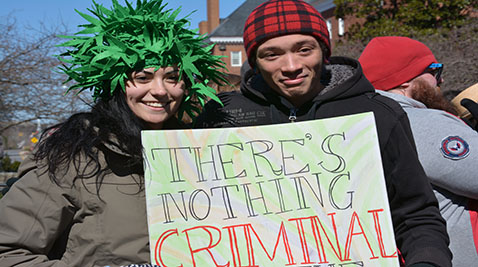ANNAPOLIS, Maryland – Supporters and detractors alike gathered in Annapolis to testify about two marijuana legalization bills being heard by the Senate Judicial Proceedings Committee Thursday afternoon.
Sen. Brian Feldman, D-Montgomery, is sponsoring a proposed referendum on an amendment to the state’s constitution and Sen. Richard Madaleno Jr., D-Montgomery, is sponsoring a bill that would legalize marijuana, and specify how it will be taxed.
Both the constitutional amendment and Madaleno’s bill would allow for the legalization of the use, possession, transportation, sale and cultivation of marijuana in the state.
Feldman’s referendum, if voters approve it, would allow an individual to possess up to two ounces of marijuana, while Madaleno’s allows for one ounce of marijuana but offers different amounts for different forms, such as edibles or creams, of the drug.
“For the Green Party, we believe in direct democracy, we believe that the people have a right to decide their own future and (Feldman’s) bill would set legalization of marijuana as a constitutional referendum for 2018,” said Maryland resident Justin Schoville.
Schoville and the Maryland Green Party “have some questions about” Madaleno’s bill because of the taxation and regulation aspects, he said.
State analysts said they believe that Madaleno’s bill legalizing and taxing marijuana would provide at least an additional $49 million in annual tax revenues for the state. There would be an initial cost of about $2.1 million to implement the legalization of the drug.
Feldman’s measure does not define how the taxes will be collected, however the revenue raised must be spent on public school education, construction and capital improvement, substance abuse treatment and prevention, mental health services and recidivism, reduction and reentry services.
“The legal cannabis market in Colorado generated nearly $1 billion in total sales and $135 million in tax revenue for the state,” the Maryland Public Policy Institute said in a January report. “Tax collections in Maryland could easily equal or exceed those in Colorado.”
However, some argue the legalization of marijuana could have unfortunate effects on communities.
“Nobody is talking about it,” Aubree Adams, a Pueblo, Colorado, resident told the University of Maryland’s Capital News Service. “Homelessness is up, high crime is up.”
Adams traveled to Maryland to testify on the negative effects of marijuana which, she said, “almost destroyed my son.”
After Colorado legalized marijuana in 2012, Adams’ eighth-grade son “accessed edibles” at school.
“It’s everywhere, you can’t keep it away from the kids,” she said.
By his freshman year of high school, her son tried to kill himself after a fit of marijuana-induced psychosis.
Her son attacked his younger brother before putting a gun to his own head, she said. He did not pull the trigger, she said, but later that night attempted to overdose on 250 ibuprofen pills.
“He vomited all night long in his sleep,” Adams said.
Her younger son has been diagnosed with post-traumatic stress disorder as a result of the incident, she said.
Adams’ older son currently lives in Houston and is part of a treatment community — which is more intensive than inpatient rehab, she said.
There is emerging research linking marijuana and suicide rates, wrote Christine Miller, a scientific adviser for drug education groups, in her testimony to the committee.
“Marijuana is not unique in this regard, because like all (drugs), it depletes the reward centers of the brain,” Miller wrote.
In Colorado, suicide rates have increased “in lock-step with increases in their marijuana use rate,” she wrote.
Suicide rates in Colorado have reached all-time highs and each one of Colorado’s 21 health regions had a suicide rate higher than the national average, according to a February report by the Colorado Health Institute.
Despite this, Feldman said, there is insufficient scientific evidence linking marijuana usage and psychosis.
However, for some, marijuana can be a remedy.
When used responsibly by adults, marijuana can be a “good alternative to prescription drugs,” said Ethan Howard, an Owings Mills, Maryland resident and the deputy director of National Organization for the Reform of Marijuana Laws — or NORML — Maryland.
Howard also supports legalization because of the disproportionate arrest rates between Caucasians and African Americans in cases involving marijuana.
“Legalization will level the playing field,” he said.
Adrian Matthews, a Baltimore resident, the director of technology for NORML Maryland, said he does not have concerns with keeping marijuana away from those younger than the legal age.
“We prevent it the same way we’ve been preventing alcohol,” he said. Stores will require ID to purchase it and parents will “lock it up” away from their children.
Additionally, the street market for the drugs will be lower because people will be incentivized to sell legally, he said.
Maryland legalized a medical marijuana program in 2013, however the process has been delayed due to a high number of applications and scrutiny. The patient registry is expected to go live by the end of March, Medical Marijuana Commision Chairman Paul Davies said Thursday afternoon.
Adams said she will “pray and hope it doesn’t pass,” while Feldman said he “simply (has) a question for the people of Maryland to weigh in on this.”

